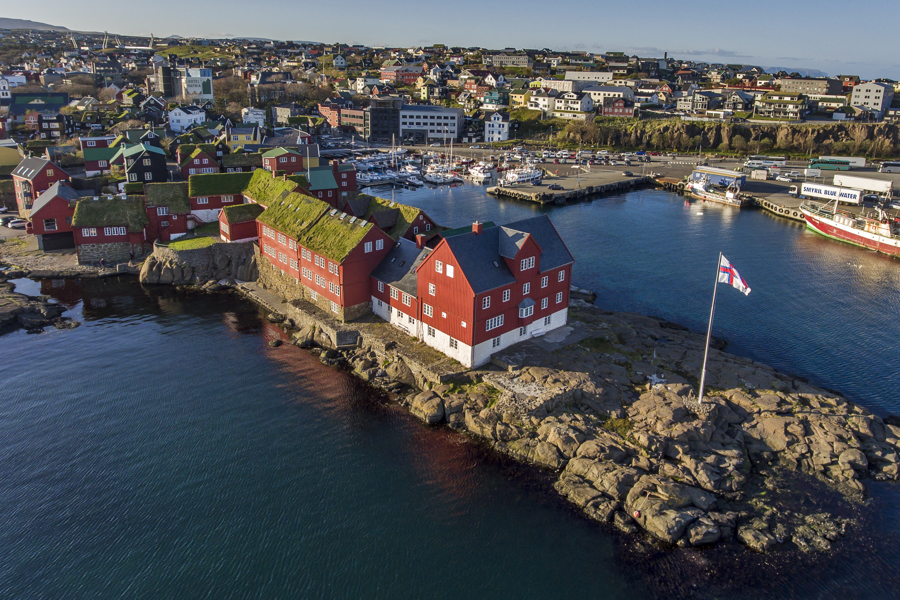
The constitutional status of the Faroe Islands
The Faroe Islands have the exclusive right to legislate and govern independently in a wide range of areas.
The Faroese court system is under the jurisdiction of the high courts in Denmark.
The Home Rule Arrangement established the Faroe Islands as an autonomous nation within the Danish Kingdom and the main objective of the arrangement was to facilitate the transfer of authority, and thus responsibility, over certain fields to Faroese authorities, to recognise the special historical, national and geographical position of the Faroe Islands, within the Kingdom of Denmark.
The autonomy of the Faroe Islands was established by the Faroe Islands Home Rule Act of 1948 - Act no. 137 of 23 March 1948.
The Home Rule Arrangement established the Faroe Islands as an autonomous nation within the Danish Kingdom and the main objective of the arrangement was to facilitate the transfer of authority, and thus responsibility, over certain fields to Faroese authorities, to recognise the special historical, national and geographical position of the Faroe Islands, within the Kingdom of Denmark.
Since the implementation of the Home Rule Act, the Faroe Islands have assumed legislative and administrative responsibility of a wide range of areas including; the conservation and management of marine resources, protection of the environment, sub-surface resources, external trade relations, financial policy, business regulation, taxation and customs, energy, transport communications, emergency preparedness, social security, culture, education and research.
The Takeover Act
The scope and procedures for the transfer of legislative and administrative powers to the Faroe Islands are regulated by Takeover Act of 2005 - Act no. 578 from the 24th of June, 2005. The Takeover Act states that the agreement is made between the Faroese and the Danish Governments as equal partners.
The Takeover Act states that the Faroese Government may decide unilaterally to exercise legislative and administrative powers with respect to the Faroe Islands in all matters not already under Faroese authority, with the exception of the constitution, citizenship, the supreme court, foreign, security and defense policy, and monetary and currency matters. Fields of responsibility not taken over by the Faroese authorities, remain under the authority of the Danish Government and Constitution. These include; the police, the prison and probation service, law of legal capacity, family law and succession law, immigration and border control, financial regulation and supervision and aviation.
The Faroese authorities decide when which field is to be taken over, but certain fields, including the police, administration of justice and courts of law and immigration, require extensive preparation, and so the timing for the takeover for these fields will be in cooperation with the Danish authorities.
The Faroese authorities gain legislative and administrative authority over each field they take over, and are responsible for the financial cost associated with said fields.
Combined with the Danish Constitution, the Home Rule Act and the Takeover Act, establish the constitutional position of the Faroe Islands within the Danish Realm.
The Foreign Policy Act
Faroese autonomy and competences in foreign relations is provided for by a treaty between the Faroe Islands and Denmark, the Foreign Policy Act of 2005.
This act states that the Faroese authorities may enter into negotiations and agreements with foreign states and international organisations, on behalf of the Realm, in regards to fields entirely taken over by the Faroese authorities.
Agreements affecting defence and security, or that are made under international laws that apply to Denmark or within international organisations in which the Kingdom of Denmark is a member are not covered by the Foreign Policy Act.
The Danish Government may, at the request of the Faroese Government, submit or support Faroese applications to international organisations, where it is consistent with the constitutional status of the Faroe Islands.
Faroese representatives may also be employed and stationed at the diplomatic missions of the Kingdom of Denmark, so they may tend to the interests of the Faroe Islands, as pertains to transferred fields of responsibility.
The Fámjin Declaration
Reinforcing foreign policy cooperation, the Danish and Faroese Governments signed a joint declaration in 2005 - the Fámjin Declaration - regarding the involvement of the Faroe Islands in foreign and security policy. According to the declaration, the Faroese authorities are to take part in international negotiations regarding matters of special interest to, or which impact, the Faroe Islands. Faroese involvement will help assert their views and protect Faroese interests. The Faroese authorities are also to be consulted prior to the ratification of any international agreements resulting from negotiations they were involved with, as part of the Fámjin Declaration, or which have a particular importance to the Faroe Islands.
